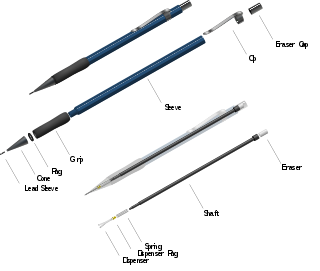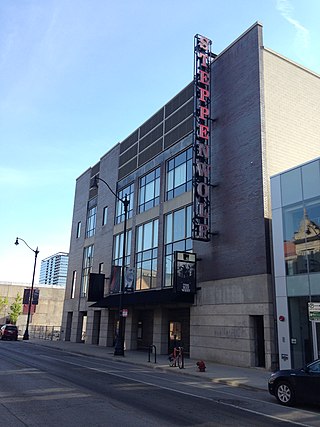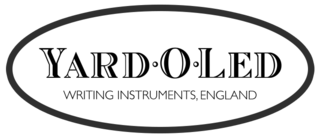
A pencil is a writing or drawing implement with a solid pigment core in a protective casing that reduces the risk of core breakage, and keeps it from marking the user's hand.

A pencil sharpener is a tool for sharpening a pencil's writing point by shaving away its worn surface. Pencil sharpeners may be operated manually or by an electric motor. It is common for many sharpeners to have a casing around them, which can be removed for emptying the pencil shavings debris into a bin.

A penciller is an artist who works on the creation of comic books, graphic novels, and similar visual art forms, with a focus on the initial pencil illustrations, usually in collaboration with other artists, who provide inks, colors and lettering in the book, under the supervision of an editor.

A mechanical pencil, also clutch pencil, is a pencil with a replaceable and mechanically extendable solid pigment core called a "lead". The lead, often made of graphite, is not bonded to the outer casing, and can be mechanically extended as its point is worn away as it is being used.

Steppenwolf Theatre Company is a Chicago theatre company founded in 1974 by Terry Kinney, Jeff Perry, and Gary Sinise in the Unitarian church on Half Day Road in Deerfield, Illinois and is now located in Chicago's Lincoln Park neighborhood on Halsted Street. The theatre's name comes from Hermann Hesse's novel Steppenwolf, which original member Rick Argosh was reading during the company's inaugural production of Paul Zindel's play, And Miss Reardon Drinks a Little, in 1974. After occupying several theatres in Chicago, in 1991, it moved into its own purpose-built complex with three performing spaces, the largest seating 550.
The Birmingham pen trade evolved in the Birmingham Jewellery Quarter and its surrounding area in the 19th century; for many years, the city was the centre of the world's pen trade, with most dip pens being produced there. At the height of the Jewellery Quarter's operations, there were about 100 pen factories, which employed around 8,000 skilled craftspeople.
The Autopoint Company was a manufacturer of pencils and desk top accessories in Chicago for about 50 years from the 1920s to around 1970.
Jules Lederer (1917–1999) was an American business executive and innovator.

Charles Rood Keeran was an Illinois inventor and businessman.

Electrographic is a term used for punched-card and page-scanning technology that allowed cards or pages marked with a pencil to be processed or converted into punched cards. The primary developer of electrographic systems was IBM, who used mark sense as a trade name for both the forms and processing system. The term has since come to be used generically for any technology allowing marks made using ordinary writing implements to be processed, encompassing both optical mark recognition and electrographic technology.

Rotring is a former German manufacturing company of technical drawing tools and writing implements. Established in 1928 as a fountain pen manufacturer, Rotring is currently a brand owned by Newell Brands after its acquisition in 1998. The name "Rotring" directly translates to "red ring" which is still placed around the barrel of their pens today. The company's name was changed to Rotring in the early 1970s to match the trademark.
Joseph Dixon (1799–1869) was an inventor, entrepreneur and the founder of what became the Dixon Ticonderoga Company, a well-known manufacturer of pencils in the United States.
Marvin Glass and Associates (MGA) was a toy design and engineering firm based in Chicago. Marvin Glass (1914–1974) and his employees created some of the most successful toys and games of the twentieth century such as Mr. Machine, Rock 'Em Sock 'Em Robots, Lite Brite, Ants in the Pants, Mouse Trap, Operation, Simon, Body Language, and the Evel Knievel Stunt Cycle.
Uni-ball and Uni are brands of pens and pencils, made by the Mitsubishi Pencil Company Limited of Japan. The brand was introduced in 1979 as a rollerball pen model, then expanding to the rest of Mitsubishi Pencil products.
Caran d'Ache is a Swiss manufacturing company of art materials and writing instruments. The company, established in 1915, produces a wide range of products including colored pencils, graphite pencils, pastels, fountain pens, ballpoint pens, mechanical pencils, markers, gouache paints, and ink cartridges.

The Yard-O-Led Pencil Company is a manufacturing company founded in London, England in 1934 by German immigrant, Ludwig Brenner, to produce his patent propelling pencils which contained twelve three inch leads. After World War II the company merged with Sampson Mordan Ltd whose founder had patented the first mechanical pencil in 1822. They built a new factory in Birmingham and took over Edward Baker Ltd, another pencil maker.
James Asbury Allison was an American entrepreneur and businessman. He was the inventor of the Allison Perfection Fountain Pen and with Carl G. Fisher, founded Prest-O-Lite, a manufacturer of automobile headlights. Also with Fisher, Frank H. Wheeler, and Arthur C. Newby he was a founder of the Indianapolis Motor Speedway and the Indianapolis 500. Allison formed the Indianapolis Speedway Team Company later known as the Allison Experimental Company, and later as the Allison Engine Company which was eventually purchased by General Motors after Allison's death becoming the Allison Division of General Motors, a manufacturer of automotive transmissions, aircraft engines, truck engines, and other products.

Warp!, also spelled Warp, was an American science-fiction play created by the Organic Theatre Company of Chicago Illinois, in 1971 by co-authors Stuart Gordon and Lenny Kleinfeld, the latter under the pseudonym Bury St. Edmund. The play moved to Broadway for a short run in February 1973. The play and its backstory became the basis for spin-off comic books and other media.
Eversharp is an American brand of writing implements founded by Charles Rood Keeran in 1913 and marketed by Keeran & Co., based in Chicago. Keeran commercialised Eversharp mechanical pencils, then expanding to fountain pens when the company was acquired by the Wahl Adding Machine Co. in 1916 and it was named "Wahl-Eversharp". The company continued until 1957 when it was acquired by Parker Pen, which continued to use the Eversharp brand for a time.

An arcade game or coin-op game is a coin-operated entertainment machine typically installed in public businesses such as restaurants, bars and amusement arcades. Most arcade games are presented as primarily games of skill and include arcade video games, Pinball machines, electro-mechanical games, redemption games or merchandisers.










